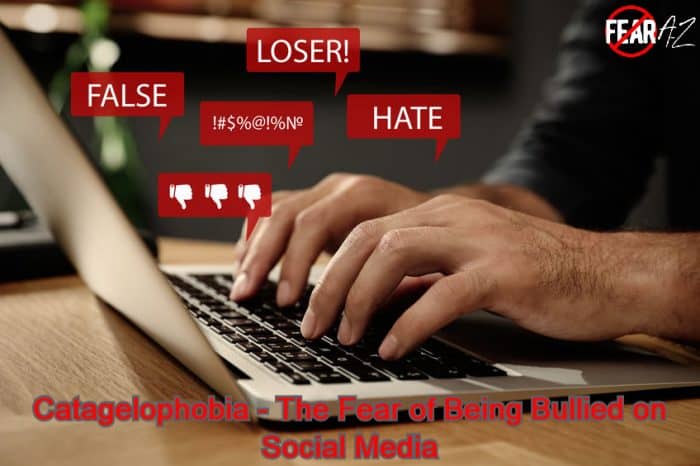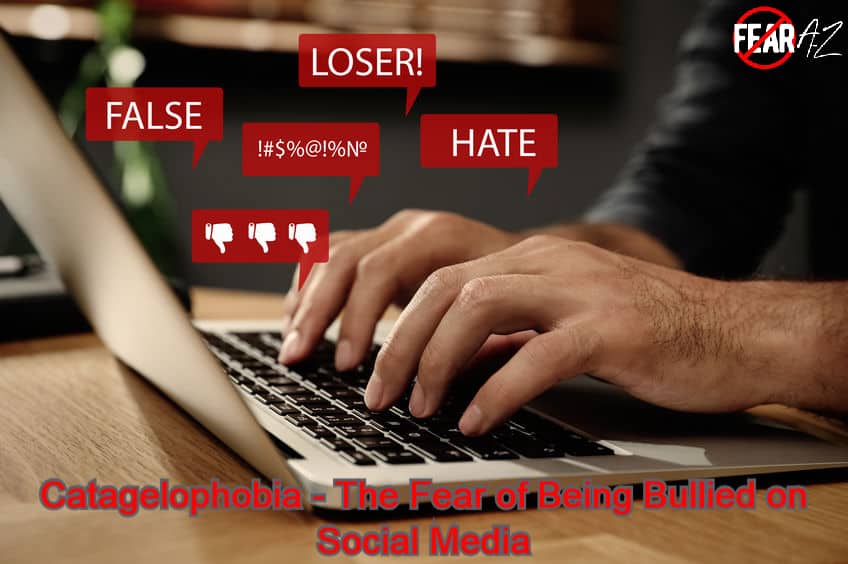Share This Article
Being Bullied Online Is a Serious Issue
Do you live in fear of being ridiculed or bullied on social media? Do you overthink your posts and worry that your pictures aren’t perfect?
Do you have low self-esteem, especially when it comes to your social media presence?
Do you take every negative comment personally? Every interaction online seems like a direct attack. You live in fear that people will mock or laugh at your social media posts.
You probably can’t wrap your head around this. But this fear has a name: catagelophobia. Catagelophobia is the fear of being bullied on social media. If you’ve experienced any of the things mentioned above, then you may suffer from this phobia.
It may seem impossible right now, but this phobia can be treated. The first step towards healing yourself is to understand why you have it and how you developed it.

Everything You Need to Know about Catagelophobia
Catagelophobia is the extreme fear of being bullied on social media. People who have this phobia often undergo panic attacks at the thought of being publicly ridiculed or criticized online.
Individuals with catagelophobia may also have similar phobias like agoraphobia, which is the fear of crowded places, or glossophobia, which is the fear of speaking publicly.
Catagelophobia Causes
This phobia can be traced to early childhood, when individuals are highly sensitive and impressionable. Children are easily influenced by harsh and unnecessary criticism, which can have a lasting effect on their mental health. A child who grows up in an environment that lacks love and kindness may withdraw from society.
What are the emotional consequences of being bullied on social media? Problems like anxiety, stress, low self-esteem, depression, and academic struggles are a few consequences of being bullied online. Cyberbullying can be more damaging because a child can be ridiculed publicly as well as privately, creating severe anxiety and stress.
Some studies also suggest that catagelophobia is genetic. This phobia may be passed down from parents, grandparents, or family members who suffer from severe anxiety or low self-confidence.
Symptoms of Catagelophobia
Every individual faces a different set of catagelophobia symptoms. The condition can become so severe that some individuals may end up withdrawing from society entirely. They believe that is the only method to protect themselves. Here are some other common signs of catagelophobia:
Mental/Emotional Symptoms
- Constantly thinking about being bullied online
- Having obsessive thoughts about the fear
- Feeling detached and isolated from everything around you
- Constant fear of losing control over yourself
Physical Symptoms
- Dizziness
- Inability to breathe properly
- Accelerated heartbeats
- Discomfort in the chest
- Shaking
- A sensation of being choked
- Profuse sweating
- Nausea
- Tingling sensations all over the body
What Can I Do to Overcome Catagelophobia?
It’s not easy trying to overcome the fear of being ridiculed on social media, but it is possible. It’s a slow process, but with persistence and patience, you can overcome this irrational fear.
Self-Help for Catagelophobia
Before you consult a professional, why not try some self-help strategies? Acknowledge and try to understand how your thoughts work. This will slowly help to curb your fears.
Exercise is also an option, as that has been proven to help people with catagelophobia and other anxiety disorders. Cardiovascular exercises tend to relieve an individual’s stress. Weight training and other forms of exercise also relieve one’s stress and anxiety, but cardiovascular exercises have been proven to release more endorphins. These happy hormones can offset intense feelings of fear and worry.
There are a variety of cardiovascular exercises that you can try, including cycling, swimming, running, skipping, and skiing. You might even consider taking up a sport like basketball, soccer, and tennis.
Doing some sort of exercise helps relieve stress and calms the mind. Exercising is an important step in the self-help process and can make it easier to deal with catagelophobia. Phobias make the mind and body weaker. Engaging in exercises like yoga that strengthen the mind and body will help.
Discussing your phobia with a trusted friend or family member is another option. You can get a confidence boost when others validate your feelings. Some also choose to join self-help groups focusing on specific phobias.
Professional Help for Catagelophobia
In some cases, self-help isn’t enough to curb the fear of catagelophobia. That’s when seeking the help of a professional is advisable. Catagelophobia treatment involves managing symptoms using one or more of the treatment options mentioned below.
Exposure Therapy
Exposure therapy can prove to be beneficial for people suffering from catagelophobia and other phobias. You’ll be asked to face your fear in a controlled environment for a specific period. For example, a therapist may show a clip of someone else getting bullied or ridiculed. The therapist may even get permission to ridicule you for a set time.
The goal in this therapy is to get used to your fears. However, this method may lead to unwanted levels of stress and anxiety. It can be extra challenging for people who suffer from extreme cases of catagelophobia. That’s why it’s important to follow the guidance of your therapist.
Cognitive Behavioral Therapy
Cognitive behavioral therapy is often used to treat anxiety disorders and obsessive-compulsive disorder. The therapist helps you learn methods to cope with your fear. With this treatment, you can change the way you think about circumstances that trigger your phobia.
Mindfulness Therapy
Mindfulness therapy is known to benefit people suffering from catagelophobia. This method of stress reduction helps people who suffer from depression, anxiety, stress, and other mental health problems. A therapist helps you channel your attention on other things rather than focusing on your fears. When done properly, this can calm you.
The easiest method to do this is to focus on one’s breathing. It works because this act doesn’t have any emotional load attached to it. Therefore, you can distract yourself from mind-numbing anxiety and break an endless loop of negative thoughts.
Meditation
Like mindfulness therapy, meditation helps you focus on things that don’t have an emotional load. Those suffering from catagelophobia often have panic or anxiety attacks. Meditation allows you to calm down and breathe easier. You can focus on the way your muscles expand and contract when breathing.
And you don’t only have to focus on breathing. You can also pay attention to your other senses to calm down. This is a slow process and requires practice, but it will have a noticeable effect on anxiety associated with catagelophobia.
How to Avoid Catagelophobia
The first step in avoiding catagelophobia is to address and acknowledge your fear. You should also try and understand what is causing you to fear being ridiculed online. In some cases, it may help to “unplug” from social media for a few days to gain perspective.
You should address your fears directly. Live in the present and don’t dwell on things you have no control over. As mentioned earlier, exercise and meditation are known to help people calm down. Implement these methods in your daily life.
In Conclusion
It may seem impossible, but you can learn to face social media without having a panic attack. Start with baby steps. Address the fear and try and understand the cause behind it.
Slowly but surely, your fear of being bullied on social media will be replaced by self-acceptance and confidence. After all, most of the people you encounter online are strangers who have no say in how you live your life. Their opinions or criticism hold less value than those of your real-life social network.



